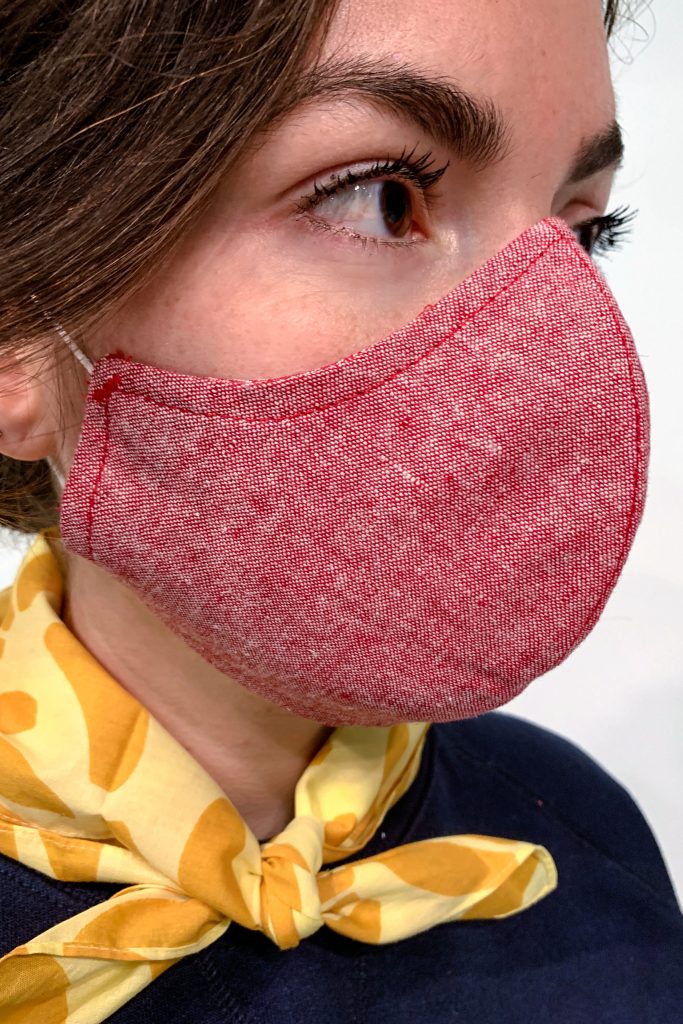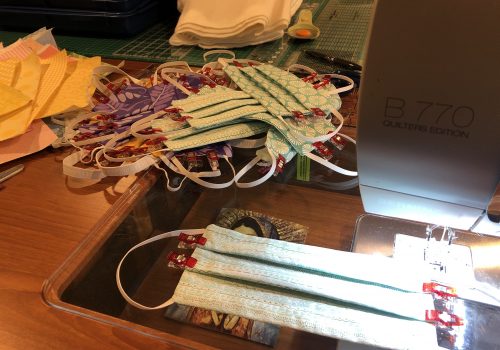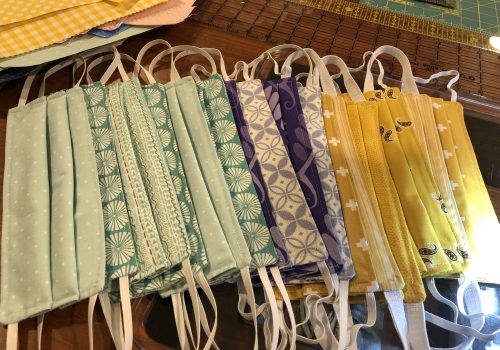The First Responders of Fashion
From luxury designers to ordinary citizens, the coronavirus pandemic is inspiring thousands to take to their sewing machines, united by a common thread: making masks for those on the frontlines of this crisis.
Wed, Apr 1, 2020
Until just a few weeks ago, the company Hedley & Bennett was busy making workwear for chefs in their Los Angeles factory: stretch denim aprons and cotton chambray shirts. Then, the coronavirus pandemic spread to the U.S., and the culinary world was hit hard.
Its founder Ellen Marie Bennett was amazed by the resilience of her favorite Los Angeles restaurants. She watched as they swiftly pivoted from serving customers, to innovative solutions like starting delivery services out of their dining rooms. A few days later, Ellen saw a tweet from New York governor Andrew Cuomo. Hospitals were running out of critical supplies, and they needed help, Cuomo said—urgently.
Luxury designer Christian Siriano was among the first to respond, offering to switch from making luxury gowns to surgical ones, and masks. Moments later, Ellen realized that Hedley & Bennett were well-placed to join the fight. They had everything they needed: a factory, tools, fabric, and tenacity.
“The cotton chambray we use for culinary workwear is built for war,” Ellen said. “It’s resilient, breathable and reusable—it’s made for chefs working 300 days a year.”
Within hours, Ellen had designed a prototype of a clinical mask, and had contacted a friend, Dr. Robert Cho, Chief of Staff at Shriners for Children Medical Center in Pasadena, California. Overnight, the designer-doctor collaboration was born. “You just have to start, not wait for someone to show up to tell you to do it,” Ellen said.
Less than two weeks on, Hedley & Bennett have paused production of culinary gear entirely, and have, almost seamlessly, manufactured almost 25,000 “Wake Up and Fight” masks in their factory. The masks are being distributed to health facilities in need, aided by members of the community.

Although cloth masks are not direct substitutes for clinical grade N95 masks, they are believed to offer some protection until clinical stocks increase, and can help prevent the wearer from touching their face.
“People are rallying to help humanity. It’s a reminder that we’ve always been in this together, it’s just that we’ve never felt it the way that we’re feeling it right now.”
All over the world, as case numbers of Covid-19 have increased, so too has the altruism of designers. Christian Siriano and Brandon Maxwell are making masks and gowns. In Illinois, Bike Bald Group is donating masks directly to vulnerable individuals and families. In Nigeria, Tiannah Toyin Lawani is adding glitter and glamor to once-sterile designs.
And from their living rooms, thousands of citizens are joining the movement, collectively stitching the fabric of human kindness.
“Ordinary people in the community are fueling all of this,” Ellen said. “A lot of people want and need to help, but they don’t know how to get it to the hospitals. We needed to do this together, with our community on board.”
3000 miles away from Los Angeles in Wilton, Connecticut—a small town on the banks of the Norwalk River—Laura, a homemaker in her 50s, is spending her evenings behind her machine, sewing face masks with cotton and kindness.
“We want goodwill, not the virus, to be contagious,” said Laura, who has donated more than 50 masks so far. “We need to flatten the curve of the virus but explode the curve of goodwill.”
Like many people, Laura cannot be with all the members of her family at this time. Because her husband is immunocompromised, her daughter, who lives in Manhattan, hasn’t been able to come home to Connecticut. But across the distance, Laura and her daughter-in-law Ruthie—who is also caring for her three small children in Alexandria, Virginia—have found time to channel their worries into this act of love.
“It is my way of making an impact and helping me cope with my own sadness and concerns for my family and the world,” Laura said.
“There is a positive multiplicity of this coronavirus because we’re seeing others be inspired and display great acts of kindness.”
There have, of course, been challenges. In the last few days, elastic has become such a hot commodity that Ruthie has even taken apart fitted bed sheets in order to use the elastic for the masks she’s making. And while the masks that the pair have produced do not meet hospital specifications, they are being received with deep appreciation at local nursing homes—The Greens at Cannondale, and Wilton Meadows Rehabilitation Center—which have expressed a desperate need for more masks.
As both Ellen and Laura have said, the new coronavirus is not the only thing spreading exponentially. Human generosity, too, is now rising.
“There are acts of kindness everywhere you look,” said Ellen. “People are rallying to help humanity. It’s a reminder that we’ve always been in this together, it’s just that we’ve never felt it the way that we’re feeling it right now.”
How to Sew a Face Mask: A tutorial on how to make your own fabric face mask from common household materials. (New York Times)
This is a new project from the Atlantic Council’s Adrienne Arsht-Rockefeller Foundation Resilience Center and the Digital Forensic Research Lab.
Share your #ResilienceStories and videos with us at resilience@atlanticcouncil.org and join us in sharing on social media: @atlanticcouncil, @ArshtRock, @DFRLab.

